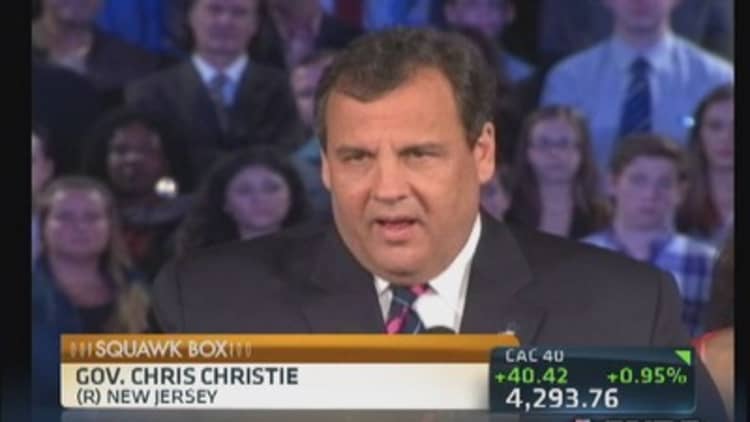The Houston Astrodome was a technological marvel when it opened in 1965. Dubbed the "Eighth Wonder of the World," it was the first domed and air-conditioned stadium and became Houston's defining landmark, a symbol of the city's can-do spirit.
But eventually bigger and sleeker stadiums took its place, leaving the iconic structure that once hosted both professional baseball and football games empty and dilapidated, its future in limbo.
After Texas voters on Tuesday rejected a referendum that would have authorized up to $217 million in bonds to turn the Astrodome into a giant convention and event center, the stadium is likely to be demolished.
(Read more: Op-ed: What the GOP needs to do to win elections again)
"We can't allow the once-proud Astrodome to sit like a rusting ship in the middle of a parking lot. This was the best effort (to revamp the stadium), and voters have turned it down," said Harris County Judge Ed Emmett. Fifty-three percent voted against the amendment.
Emmett said a final decision on what happens to the Astrodome will be up to the Commissioners Court, the group of local officials who manage the county. But he said the stadium's future was pretty much sealed with the referendum's failure. He said a decision would have to be made quickly but didn't say exactly when that would happen.
(Read more: Christie wins re-election in New Jersey)

In other ballot measures around the country in Tuesday's elections:
MINIMUM WAGE
WASHINGTON STATE: Early returns showed voters in the small Seattle suburb of SeaTac were passing a measure that would raise the minimum wage for workers at Seattle-Tacoma International Airport and nearby large hotels to $15 an hour. Washington state already has the highest minimum wage at $9.19.
NEW JERSEY: Voters approved a constitutional amendment raising the state's minimum wage by $1, to $8.25 an hour, and to provide for automatic cost-of-living increases, as 10 other states already do.
(Read more: Minimum wage votes could signal trend)
MARIJUANA
COLORADO: Voters approved a 25 percent tax on newly legal recreational marijuana to fund school construction. Opponents argued the tax rate would benefit black market sales.
MAINE: Voters in Portland, Maine's largest city, declared victory on a measure to legalize possession of recreational amounts of marijuana.
MICHIGAN: Voters in Ferndale, Jackson and Lansing approved proposals offering some legal protection to users of small amounts of marijuana.
SECESSION
COLORADO: Eleven rural Colorado counties delivered a divided vote on an effort to form a 51st state called North Colorado. Six counties voted against the idea—including Weld County, whose commissioners spearheaded the effort, citing frustration with the Democrat-led state government that they claim neglects rural interests. Five counties voted for it.
GAMBLING
NEW YORK: New York voters bet big on casino gambling as an economic energy shot, agreeing to let seven Las Vegas-style gaming palaces be built around the state, including eventually in New York City.
MASSACHUSETTS: Voters in Palmer rejected Mohegan Sun's plan for a $1 billion resort casino and entertainment complex. And Suffolk Downs says it will reassess plans to build a resort casino at the 78-year-old thoroughbred race track after voters in a Boston neighborhood rejected its proposal and residents of a neighboring community approved it.
HEALTH AND ENVIRONMENT
MAINE: Residents of South Portland rejected a proposal aimed at blocking the flow of tar sands oil from western Canada to the city. Environmentalists say the thick, gooey oil is more difficult to clean up than conventional crude oil, contains harmful chemicals and releases more greenhouse gases. Supporters of a pipeline say a ban would hamper the growth of existing petroleum-based businesses.
WASHINGTON STATE: A measure that would require mandatory labeling of genetically engineered foods was failing with more than 980,000 ballots counted in unofficial returns. Washington would be the first state to put such requirements in place, and the campaign has shaped up to be one of the costliest in state history.
GAY RIGHTS
MICHIGAN: Residents of the Detroit suburb of Royal Oak approved an ordinance making it illegal to discriminate based on sexual orientation and a number of other factors.
SCHOOL FUNDING
COLORADO: A kindergarten-through-12th-grade school-finance overhaul was rejected; it would have increased income taxes about $1 billion a year and revived a progressive income tax structure abandoned in the 1980s.
Back in Texas, while some supporters who attended an election watch party Tuesday evening in an exhibition hall across from the Astrodome vowed to continue fighting for the stadium, preservation groups who had championed the referendum said there was really nothing more that could be done.
"Because it sat vacant for many years, there's been a lack of passion for it," said Beth Wiedower, senior field officer with the National Trust for Historic Preservation, one of the groups backing the plan.
Wiedower said efforts to promote the amendment had reinvigorated that passion. "But it just wasn't enough," she said.
Opened in 1965, the Astrodome was home to MLB's Houston Astros and the NFL's Houston Oilers. It was spacious enough to fit an 18-story building under its 208-foot high roof. The stadium was also home to the city's rodeo and hosted concerts and other events, including the "Battle of the Sexes" tennis match between Bobby Riggs and Billie Jean King in 1973.
But it hasn't been home to a sports team since 1999 and has been closed to all events since 2009. While still structurally sound, the iconic stadium had fallen into disrepair. On Saturday, thousands of people bought stadium seats, pieces of AstroTurf and other items at a "yard sale" and auction of Astrodome memorabilia.
The stadium's most prominent use in recent years was as a shelter for Louisiana residents displaced by Hurricane Katrina in 2005.
—By The Associated Press, with CNBC.com

